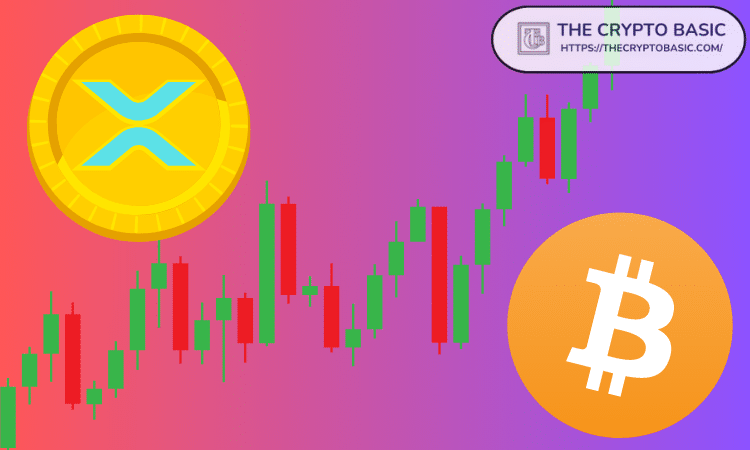What Is XRP And How Does It Differ From Bitcoin?

Table of Contents
Understanding XRP
What is XRP?
XRP is a cryptocurrency designed to function as a bridge currency within the Ripple network, a platform facilitating fast and low-cost cross-border payments. Unlike Bitcoin, which operates as a decentralized digital currency, XRP aims to streamline international transactions by providing a more efficient and scalable solution for financial institutions. Key aspects of XRP's functionality include its role in facilitating quick settlements, minimizing transaction fees, and offering enhanced scalability compared to some other cryptocurrencies. This makes it a compelling alternative for businesses seeking to reduce costs and improve efficiency in their international payment processes.
- XRP's use in facilitating fast and low-cost international transactions: XRP's speed and low fees make it attractive for businesses dealing with significant cross-border transactions. The reduced latency compared to traditional banking systems translates to considerable time and cost savings.
- The Ripple network's infrastructure and its impact on XRP's functionality: The Ripple network acts as the backbone for XRP transactions, providing a secure and reliable infrastructure for its operation. The network's robust technology contributes to XRP's speed and efficiency.
- Comparison of XRP's transaction speed to Bitcoin's: XRP transactions are significantly faster than Bitcoin transactions, often completing in a matter of seconds, while Bitcoin transactions can take minutes or even hours to confirm.
- Explanation of XRP's consensus mechanism: XRP uses a unique consensus mechanism different from Bitcoin's proof-of-work. This contributes to its energy efficiency and faster transaction speeds.
Key Features of XRP
XRP boasts several compelling features that differentiate it from Bitcoin. Its speed, low transaction fees, and scalability are key advantages for businesses and financial institutions seeking efficient payment solutions. These characteristics, when contrasted with Bitcoin's features, reveal distinct strengths and weaknesses depending on the intended use case.
- Detailed explanation of XRP's low transaction fees: XRP transactions typically involve minimal fees, making it a cost-effective solution for high-volume transactions.
- Discussion of XRP's high transaction throughput compared to Bitcoin: XRP's network can handle a significantly higher volume of transactions per second than Bitcoin's network.
- Mention of XRP's energy efficiency in comparison to Bitcoin's energy consumption: XRP's consensus mechanism is considerably more energy-efficient than Bitcoin's proof-of-work system.
Understanding Bitcoin
What is Bitcoin?
Bitcoin is a decentralized digital currency, operating on a blockchain technology that ensures transparency and security. It functions as a peer-to-peer electronic cash system, eliminating the need for intermediaries like banks. Bitcoin's value is derived from its scarcity (a limited supply of 21 million coins) and its growing acceptance as a store of value and a medium of exchange. The underlying blockchain technology secures each transaction, making it resistant to manipulation and fraud.
- Explanation of Bitcoin's decentralized nature and its implications: Bitcoin's decentralized nature means it is not controlled by any single entity, making it resistant to censorship and government control.
- Description of Bitcoin mining and its energy consumption: Bitcoin mining involves using powerful computers to solve complex mathematical problems to verify transactions, a process that consumes substantial energy.
- Discussion of Bitcoin's limited supply and its effect on value: The limited supply of Bitcoin contributes to its perceived scarcity and drives its value.
Key Features of Bitcoin
Bitcoin's key features, namely its decentralization, security, and scarcity, are central to its appeal as a digital asset. These features contribute to its resilience and its potential as a long-term store of value.
- Detailed explanation of Bitcoin's security features: Bitcoin's cryptographic security ensures that transactions are tamper-proof and irreversible.
- Discussion of the implications of Bitcoin's limited supply of 21 million coins: The finite supply of Bitcoin creates scarcity, driving up demand and potentially increasing its value over time.
- Explanation of Bitcoin's proof-of-work consensus mechanism and its energy implications: Bitcoin's proof-of-work system requires substantial energy consumption for transaction verification.
Key Differences between XRP and Bitcoin
Decentralization
While both XRP and Bitcoin utilize blockchain technology, their degree of decentralization differs significantly. Bitcoin is largely decentralized, with no single entity controlling its network. In contrast, Ripple, the company behind XRP, plays a more significant role in its ecosystem, raising questions about its complete decentralization. This distinction is critical for those prioritizing complete decentralization as a core characteristic of a cryptocurrency.
- Discussion of Ripple's role in XRP's ecosystem and its impact on decentralization: Ripple's involvement in XRP's development and governance contrasts with the community-driven nature of Bitcoin.
- Comparison of the levels of control exerted by Ripple versus the community over Bitcoin: Ripple exerts a greater degree of control over XRP than the community exerts over Bitcoin.
Transaction Speed and Fees
One of the most significant differences between XRP and Bitcoin lies in their transaction speeds and associated fees. XRP boasts considerably faster transaction times and significantly lower fees compared to Bitcoin. This difference makes XRP a more attractive option for high-volume, real-time transactions, especially in the financial services sector.
- Numerical comparison of average transaction times for both XRP and Bitcoin: XRP transactions are typically completed within seconds, while Bitcoin transactions can take minutes or even hours.
- Numerical comparison of average transaction fees for XRP and Bitcoin: XRP's transaction fees are generally much lower than Bitcoin's.
Use Cases
The primary use cases for XRP and Bitcoin also differ considerably. Bitcoin is predominantly viewed as a store of value and a medium of exchange, similar to digital gold. XRP, on the other hand, is primarily designed to facilitate fast and efficient cross-border payments, particularly for financial institutions.
- Explain the use of Bitcoin as a digital gold and its store-of-value properties: Bitcoin's scarcity and relative stability make it an attractive asset for long-term investment.
- Highlight XRP's use in institutional cross-border transactions: XRP's speed and low fees are beneficial for banks and other financial institutions processing international payments.
Conclusion
In summary, XRP and Bitcoin, while both existing in the cryptocurrency landscape, cater to vastly different needs. Bitcoin, with its decentralized nature and established position as a store of value, appeals to individuals seeking a secure and censorship-resistant digital asset. XRP, with its focus on speed, efficiency, and low transaction costs, is geared towards institutional applications, particularly cross-border payments. Understanding the nuances between XRP and Bitcoin is crucial for navigating the ever-evolving cryptocurrency landscape. Continue your exploration of both XRP and Bitcoin to make informed decisions in this exciting and dynamic market.

Featured Posts
-
 Rugby World Cup Dupont Leads France To Victory Against Italy
May 01, 2025
Rugby World Cup Dupont Leads France To Victory Against Italy
May 01, 2025 -
 Tahun Ini Bkpm Bidik Rp 3 6 Triliun Investasi Di Pekanbaru
May 01, 2025
Tahun Ini Bkpm Bidik Rp 3 6 Triliun Investasi Di Pekanbaru
May 01, 2025 -
 Northumberland Mans Homemade Boat A Global Voyage
May 01, 2025
Northumberland Mans Homemade Boat A Global Voyage
May 01, 2025 -
 Duurzaam Schoolgebouw Kampen Rechtszaak Tegen Enexis Om Stroomaansluiting
May 01, 2025
Duurzaam Schoolgebouw Kampen Rechtszaak Tegen Enexis Om Stroomaansluiting
May 01, 2025 -
 Clase Nacional De Boxeo En El Zocalo Fotos Y Reportaje
May 01, 2025
Clase Nacional De Boxeo En El Zocalo Fotos Y Reportaje
May 01, 2025
